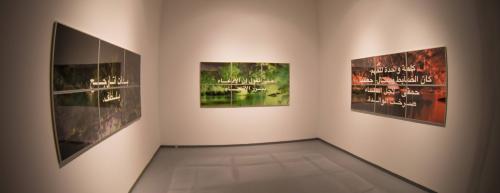
Birzeit University Museum hosted “Exile is Hard Work”, the solo exhibition by Palestinian artist Aissa Deebi from the 4th November 2017 to 4th January 2018. The exhibition included two bodies of work by Aissa Deebi: The Trial (2013) and Motherland (2016). The projects were previously conceived for biennials: The Trial for the 2013 Venice Biennale and Motherland for the 2016 Çanakkale Biennale. By bringing together these two works, this exhibition created a dialogue between their themes, including revolution and exile, but it also raised a number of issues related to their original context in international exhibitions in which national identity plays a particular role.
The Trial is a two channel video installation that depicts a group of actors in a black box theater reading from the transcript of a 1973 statement made by Daud Turki, a Palestinian poet who was on trial in an Israeli court for espionage and collaborating with the enemy. Turki was a communist and his statements echo the revolutionary rhetoric of the time. Deebi filmed this work in Haifa, which is not only where Turki was from but is also where Deebi grew up. At the time of its making, Deebi was living in Cairo, in the wake of the 2011 revolution in Egypt. While this work stems from the particular nature of Palestinian revolution and its links to international currents of revolutionary struggle in the 1970s, it has resonances with Egypt’s political situation in 2013 and larger questions about revolutionary struggles in general.
Motherland is an elegy to Deebi’s mother and a photographic meditation on exile. Deebi shot images of landscapes in the United States and Switzerland, two countries that he has lived in for the past few years. This project asked, how do we define “home” and “mother?” What is the affective nature of being in between spaces? And finally, how do larger political currents relate to one’s personal life? Motherland was shown as a series of photographic prints that evoked the poetics of space.
The context for The Trial at the Palestinian Pavilion of the Venice Biennale, raised the question of nationalism and its pageantry in major international exhibitions. How is identity performed in this context and how are some nations privileged more than others? How do real politics intersect with the politics of display? This was especially relevant to the subject matter of The Trial, which was a communist view of class struggle that transcended nationalism, race, or other identity positions. On the other hand, Motherland was originally conceived of for the 2016 Çanakkale Biennale, an exhibition that was cancelled because of political pressures in Turkey, following a failed military coup. In this case, the biennial was subject to the particular conditions of a national context. So, given these histories, The Trial and Motherland were not only artworks that were about political and personal histories of Palestinian dispossession and exile. They also evoked the larger exhibition histories that have embedded within them related political currents.
In conjunction with the exhibition at Birzeit University Aymon Kreil moderated a panel at the Khalil Sakakini Cultural Center: The Struggle over Universals: Claiming the World Within and Beyond War, Occupation and Exile. This panel aimed to discuss both the claiming and contesting of universals through art in Palestine. In this frame, speakers addressed the struggle over universals in the context of war, occupation and exile and the manner it resonates in artistic practice. The panel had also addressed the role of institutions, such as biennales, art schools, residences, and galleries for reproducing existing models of significance but also for offering venues for their contestation and for alternative formulations of universals. Finally, this event had explored the ways artists from Palestine can assert the significance of their work both inside and outside of its territory.
Aissa Deebi is a Palestinian artist and scholar based in Geneva. His early work investigated the complexity of daily practices in post 1948 Palestine including Days like this (1997): Makkan (1998); My Dream House (1999); Nothing is New Only Forgotten (2000). Later, Deebi’s work tackled the theme of immigration and alienation, which culminated in his PhD, providing critical analysis of Diaspora as a creative space. In tandem with his scholarly work, Deebi produced a body of works that interrogate the complex phenomena of cultural-migration and Diaspora reality as experienced by a Palestinian immigrant artist in post Sept 11 America. These works included Killing Time (2004); Naked Heroes (2003); Dead Sweet (2004) and Tal El Samak (2011).
Deebi also represented Palestine at the 55th Venice Biennale. Dr. Deebi has taught at the Winchester School of Art, University of Southampton in the United Kingdom, Centro de Estudios Superiores de Monterrey Design, Mexico Chulalongkorn University, Bangkok Thailand, The American University of Cairo’s Arts Department as a Professor of Art and Design, and in 2013-2016, Dr. Deebi was the chair of the Department of Art & Design at Montclair State University. Dr. Deebi was the founding member of Art East, New York, where he served as the first Director of the Visual Arts and Director of the board. His work has been exhibited globally including: The Venice Biennale, Çanakkale Biennale, Turkey, Art Lab Gnesta, Sweden, Berlin Art Laboratory, Germany, Art Space Gallery at Sang Myung University, Seoul, Korea, Darb 1718, Cairo, Egypt, Kunstverein, Germany, The Queens Museum of Art in New York, Haus am Lutzowplatz in Berlin, Tanit Art Gallery, Beirut, Lebanon, Beirut Art Fair, Lebanon, Asia-Pacific Triennial, Taipei in Taiwan, VCU Art Gallery in Doha, Elga Wimmer Gallery in New York, and Art Dubai.

